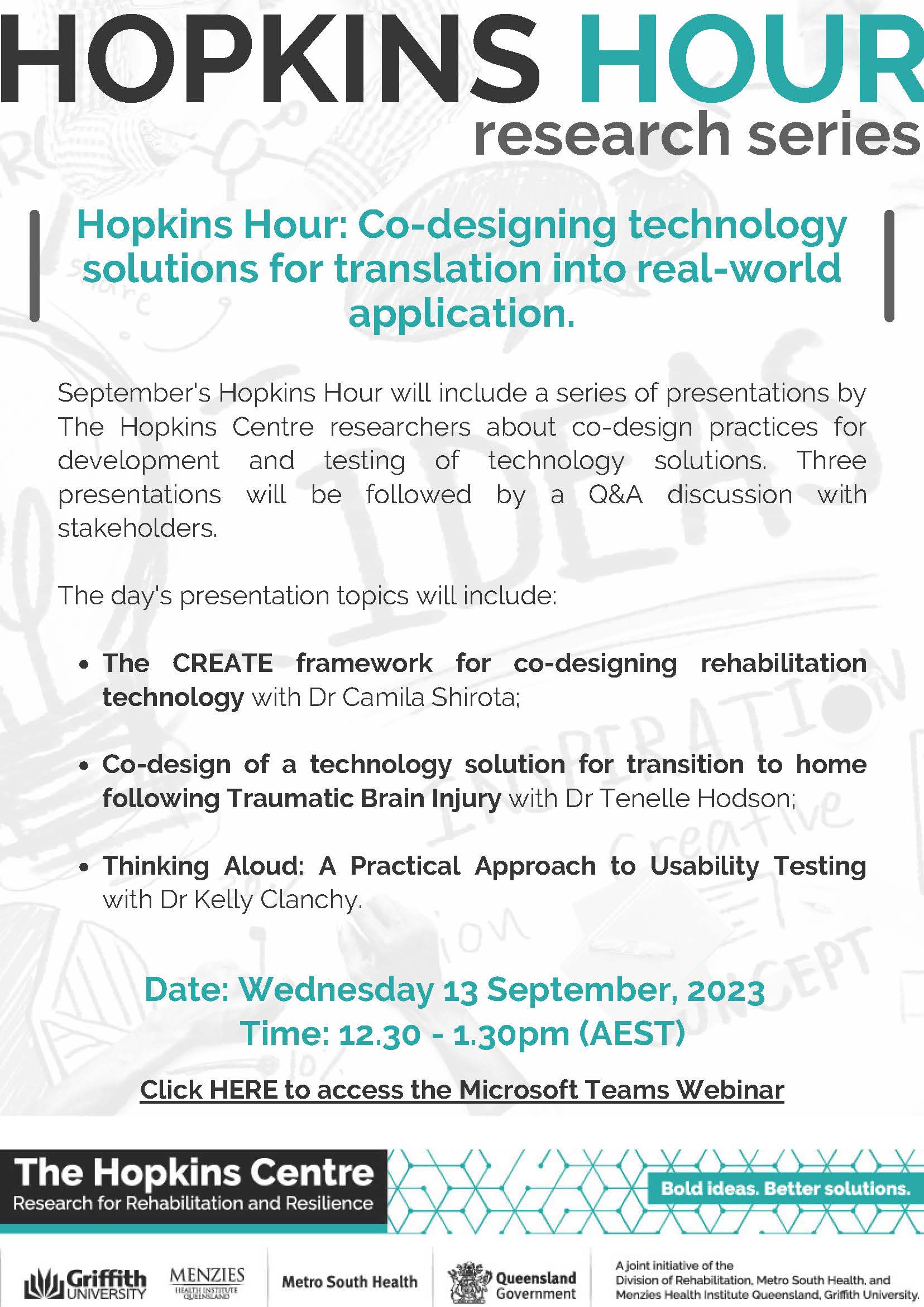Co-designing technology solutions for translation into real-world application

Co-design in the rehabilitation setting enables providers and technologies to deliver fit-for-purpose solutions that increase people’s ability to participate with dignity in the home, in the community and in the workplace. At The Hopkins Centre, researchers recognise that meaningful collaboration between all stakeholders is required to ensure that technologies are responsive and acceptable to rehabilitation challenges. This is why The Hopkins Centre's researchers are always looking to achieve best-practice in the practice of co-design when developing and testing new technology solutions for rehabilitation settings.
Join us for this Hopkins Hour to hear how The Hopkins Centre's researchers are promoting and achieving best practice in co-design with novel and practical approaches.
This event is organized by The Hopkins Centre (Hopkins Hour Research Series) and co-promoted by the IEEE EMBS QLD Chapter.
Date and Time
Location
Hosts
Registration
-
 Add Event to Calendar
Add Event to Calendar
Loading virtual attendance info...
- Contact Event Hosts
- Co-sponsored by The Hopkins Centre
Speakers
Camila Shirota of HabITec, The Hopkins Centre, Griffith University
The CREATE framework for co-designing rehabilitation technology
Biography:
Dr. Camila Shirota is a rehabilitation engineer and biomechanist, and leads HabITec, a program within The Hopkins Centre focused on increasing the use of technology in disability and rehabilitation through co-design. She has 15 years of experience in co-developing rehabilitation technologies, including implementing technology-based tools into clinical practice.
Email:
Tenelle Hodson of The Hopkins Centre, Griffith University
Co-design of a technology solution for transition to home following Traumatic Brain Injury
Biography:
Tenelle Hodson is an Occupational Therapist and Lecturer at Griffith University. Tenelle recently submitted her PhD thesis, completed at the University of Queensland, which investigated the experiences of people with mild stroke who received either standard care or a novel, self-management, telehealth program titled MiStrEnGTH (Mild Stroke Enhancing and Guiding Transition Home). Tenelle’s research experience is predominantly qualitative and within the stroke field, with a focus on transitional experiences.
Email:
Kelly Clanchy of Griffith University
Thinking Aloud: A Practical Approach to Usability Testing
Biography:
Kelly Clanchy’s research area relates to the promotion of physical activity participation in adults with chronic disease and disability. This includes projects relating to the measurement of physical activity participation in individuals with a disability, mediators of physical activity participation, evaluation of physical activity promotion interventions, and the translation of evidence-based interventions into clinical practice.
Agenda
This event's presentation topics will include:
- The CREATE framework for co-designing rehabilitation technology with Dr Camila Shirota;
- Co-design of a technology solution for transition to home following Traumatic Brain Injury with Dr Tenelle Hodson;
- Thinking Aloud: A Practical Approach to Usability Testing with Dr Kelly Clanchy.
The three presentations of this event will be followed by a Q&A discussion with Paralympian Matt McShane about User-Centred Design and the 'Repair Cafe'.

